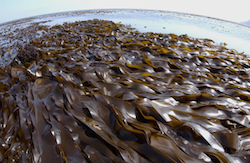Researchers at Aberystwyth University are looking at seaweed, more specifically kelp (Laminaria digitata), as a potential feedstock for biofuels. Lead Researcher, Dr. Jessica Adams, says that seaweed may be a viable feedstock, especially if harvested in the summer as suitability of its chemical composition varies by season. The research found that July is the best time to harvest kelp as its carbohydrate levels are at their highest ensuring optimal sugar release for biofuel production. Metal content is also at its lowest.
“The storage carbohydrate and soluble sugars get converted into ethanol in the fermentation process, so we need as much as possible,” said Adams. “Metals can inhibit the yeast too so we also want these to be as low as possible.”
 Welsh coast researchers collected monthly samples of kelp and then used chemical analysis to assess the seasonal variability. The results of the study were presented during the Experimental Biology Annual Conference in Glasgow on July 4th.
Welsh coast researchers collected monthly samples of kelp and then used chemical analysis to assess the seasonal variability. The results of the study were presented during the Experimental Biology Annual Conference in Glasgow on July 4th.
The research team noted that kelp can be converted to biofuel in various ways including fermentation or anaerobic digestion that produces ethanol or through methane or pyrolysis that produces bio-oil. The chemical composition of the seaweed is important in both of these processes. Researchers believe that marine ecosystems are an untapped resource and are capable of producing more biomass per square metre than fast growing terrestrial plants such as sugarcane.
“Seaweed biofuel could be very important in future energy production,” said Adams. “What biofuels provide that other renewables such as wind power cannot is a storable energy source that we can use when the wind drops.”
The next focus of the research will be to work to improve the viability of the process by identifying and extracting high value substances, such as pigments and phenols, before the rest of the seaweed is used to produce biofuel.

